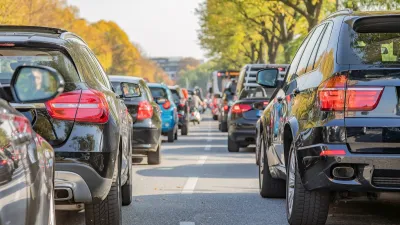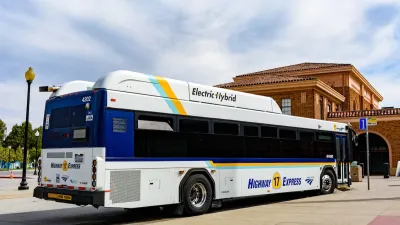A new study finds that sometimes closing roads can improve traffic flow by forcing people to make alternative choices to the shortest route.
"At first blush, this study seems dissonant with findings that traffic flows can be improved by increasing vehicular anarchy. As I noted a few months back, there is considerable evidence that removing all traffic controls – lights, signs, road markings, and even the distinction between streets and sidewalks – can actually make traffic move more smoothly, as well as cut down on the number of accidents and increase the area's economic vitality. The idea behind these "shared streets," which have been successfully deployed in many European cities, is that the lack of traffic signs makes you take personal responsibility for directly negotiating with the pedestrians, cyclists, and other cars around you, instead of, say, gunning it through an intersection just because you know you have the light.
But maybe these two traffic models have more in common than it first seems. Both encourage individuals to drive more slowly so that everyone gets to his destinations faster. Both favor a holistic approach to traffic, one that designs from the perspective of the overall flow rather than that of an individual driver. And both open up more space for pedestrians."
FULL STORY: Does closing roads cut delays?

Manufactured Crisis: Losing the Nation’s Largest Source of Unsubsidized Affordable Housing
Manufactured housing communities have long been an affordable housing option for millions of people living in the U.S., but that affordability is disappearing rapidly. How did we get here?

Americans May Be Stuck — But Why?
Americans are moving a lot less than they once did, and that is a problem. While Yoni Applebaum, in his highly-publicized article Stuck, gets the reasons badly wrong, it's still important to ask: why are we moving so much less than before?

Research Shows More Roads = More Driving
A national study shows, once again, that increasing road supply induces additional vehicle travel, particularly over the long run.

Judge Halts Enforcement of Anti-Homeless Laws in Grants Pass
The Oregon city will be barred from enforcing two ordinances that prosecute unhoused residents until it increases capacity and accessibility at designated camping sites.

Advancing Sustainability in Los Angeles County Schools
The Los Angeles County Office of Education’s Green Schools Symposium brings together educators, students, and experts to advance sustainability in schools through innovative design, climate resilience strategies, and collaborative learning.

Using Old Oil and Gas Wells for Green Energy Storage
Penn State researchers have found that repurposing abandoned oil and gas wells for geothermal-assisted compressed-air energy storage can boost efficiency, reduce environmental risks, and support clean energy and job transitions.
Urban Design for Planners 1: Software Tools
This six-course series explores essential urban design concepts using open source software and equips planners with the tools they need to participate fully in the urban design process.
Planning for Universal Design
Learn the tools for implementing Universal Design in planning regulations.
City of Moreno Valley
Institute for Housing and Urban Development Studies (IHS)
City of Grandview
Harvard GSD Executive Education
NYU Wagner Graduate School of Public Service
City of Cambridge, Maryland
Newport County Development Council: Connect Greater Newport




























